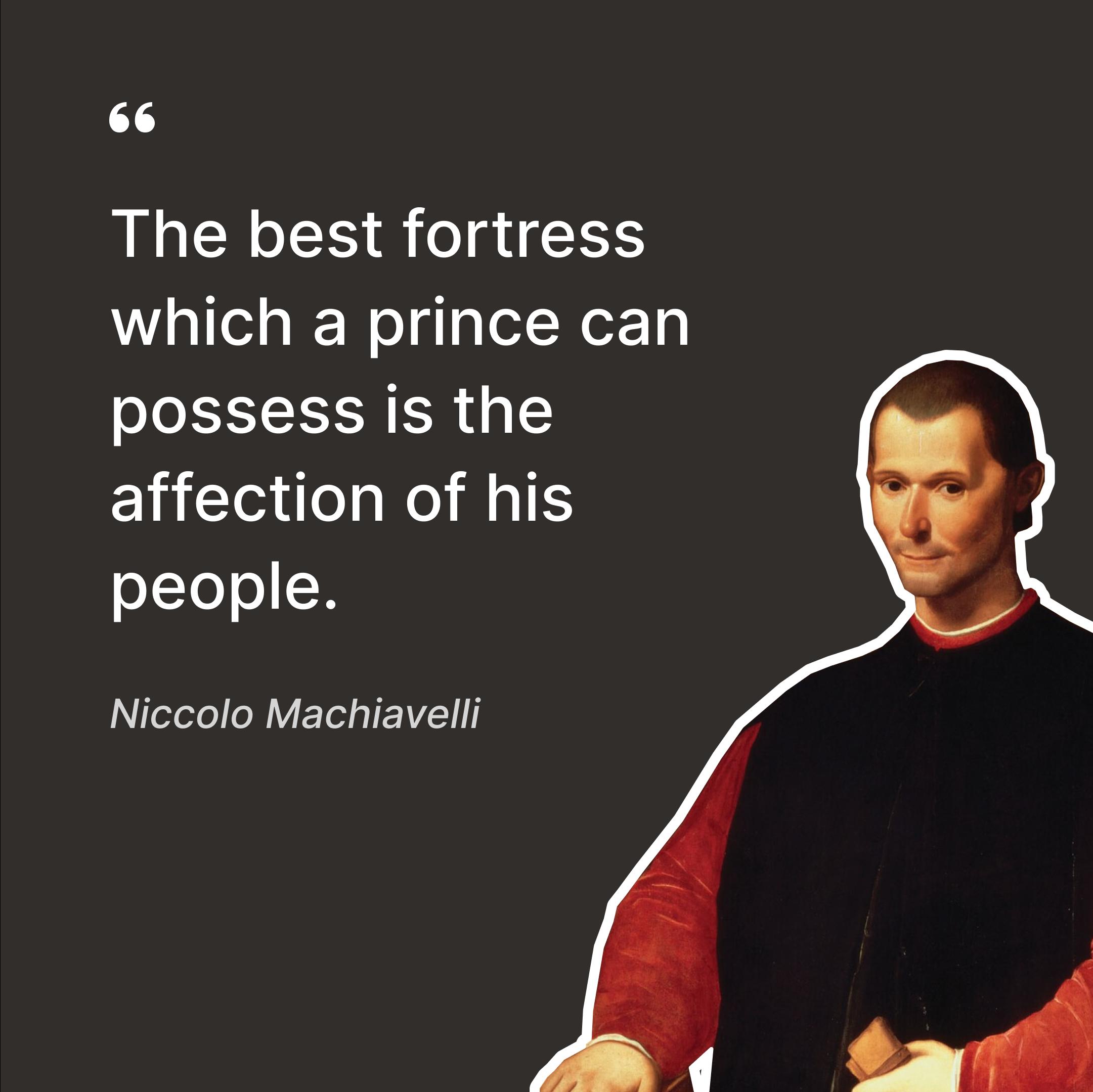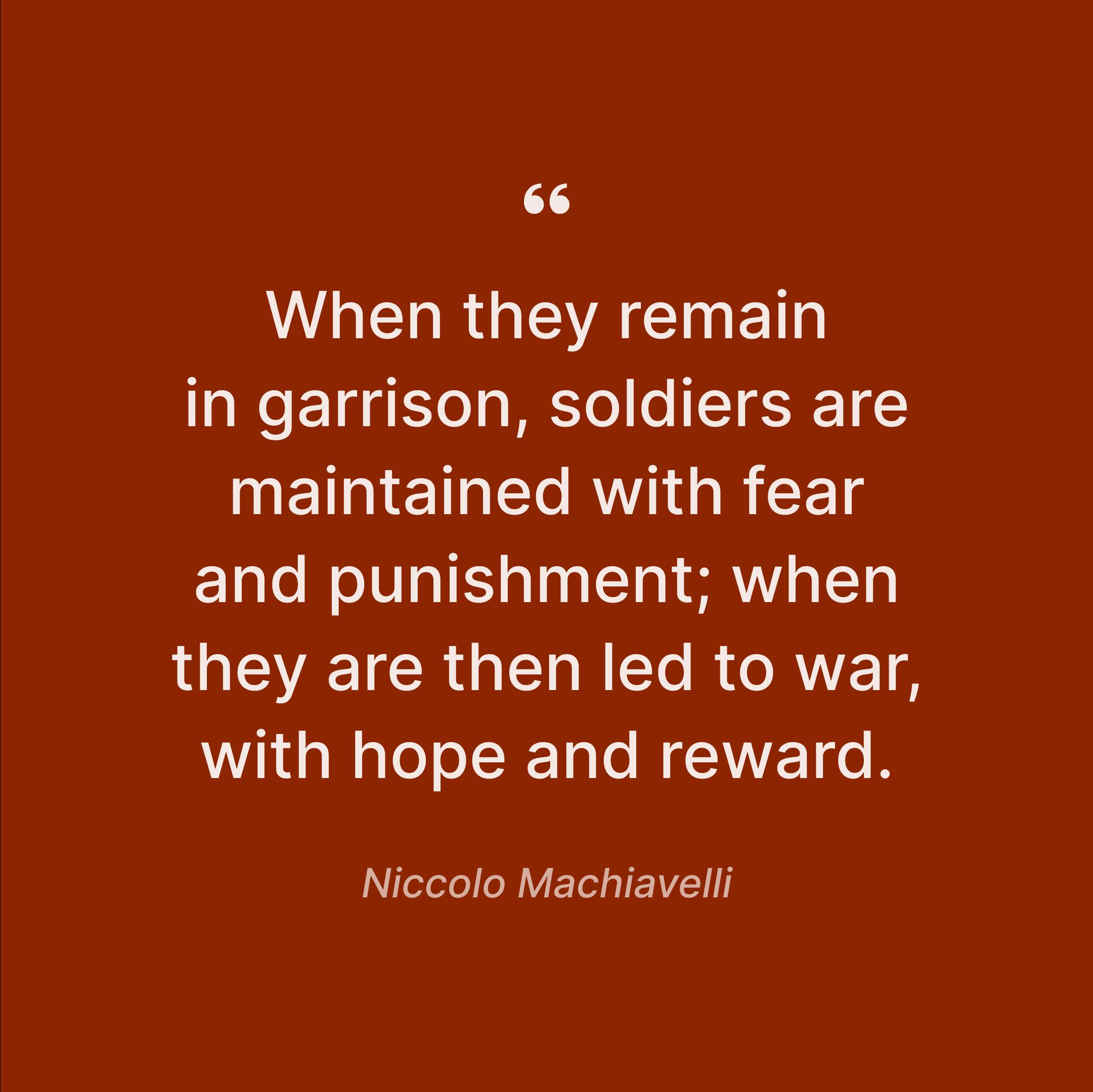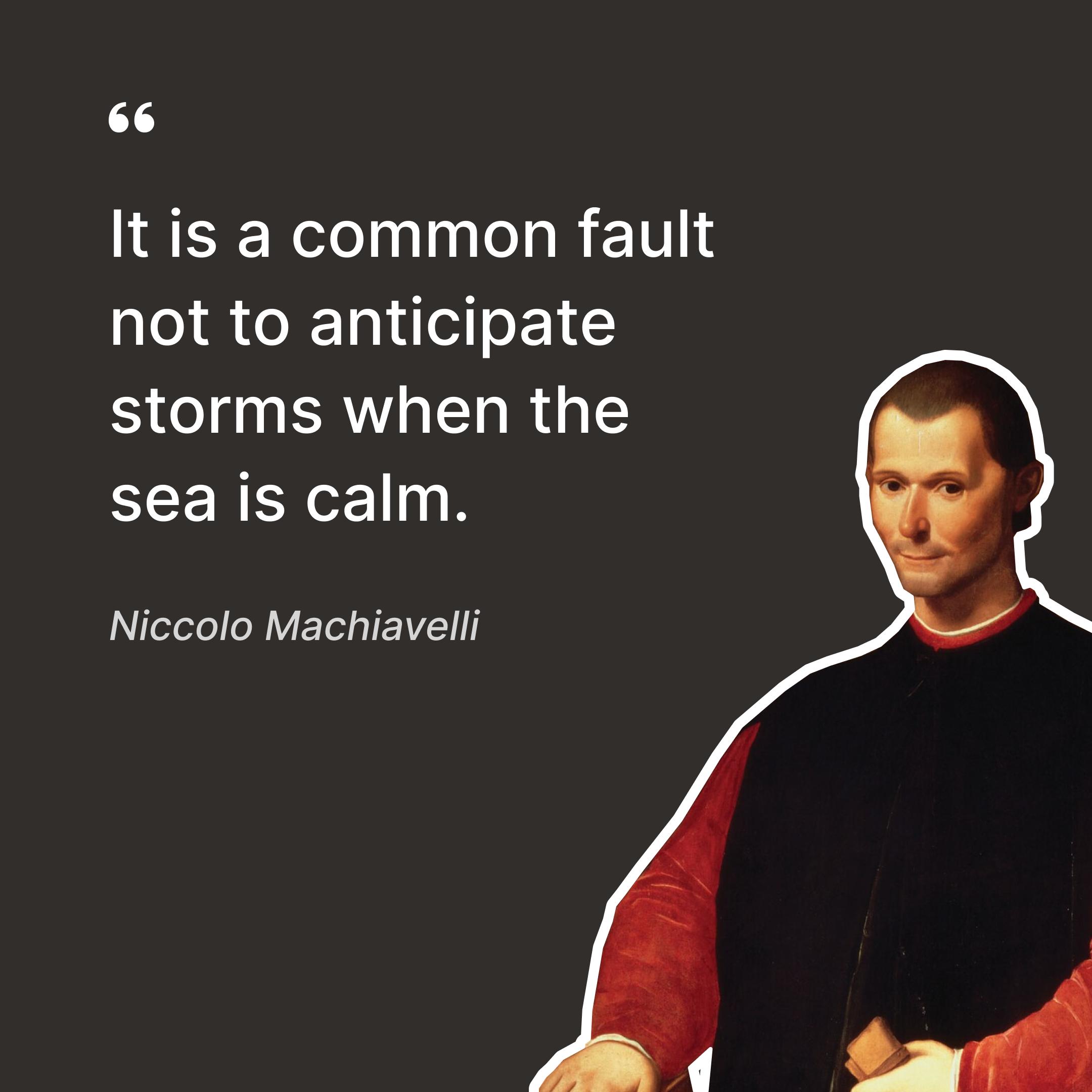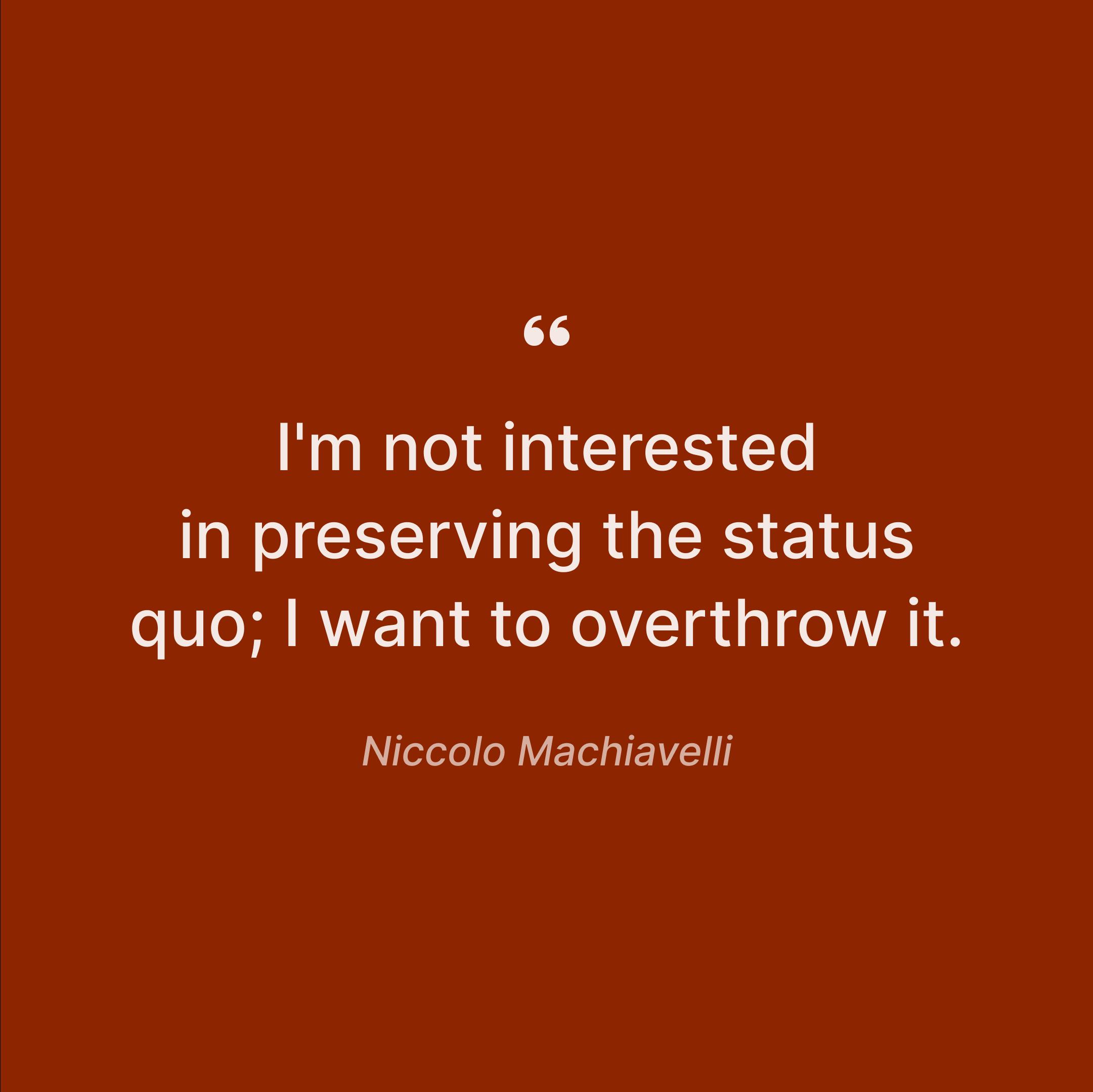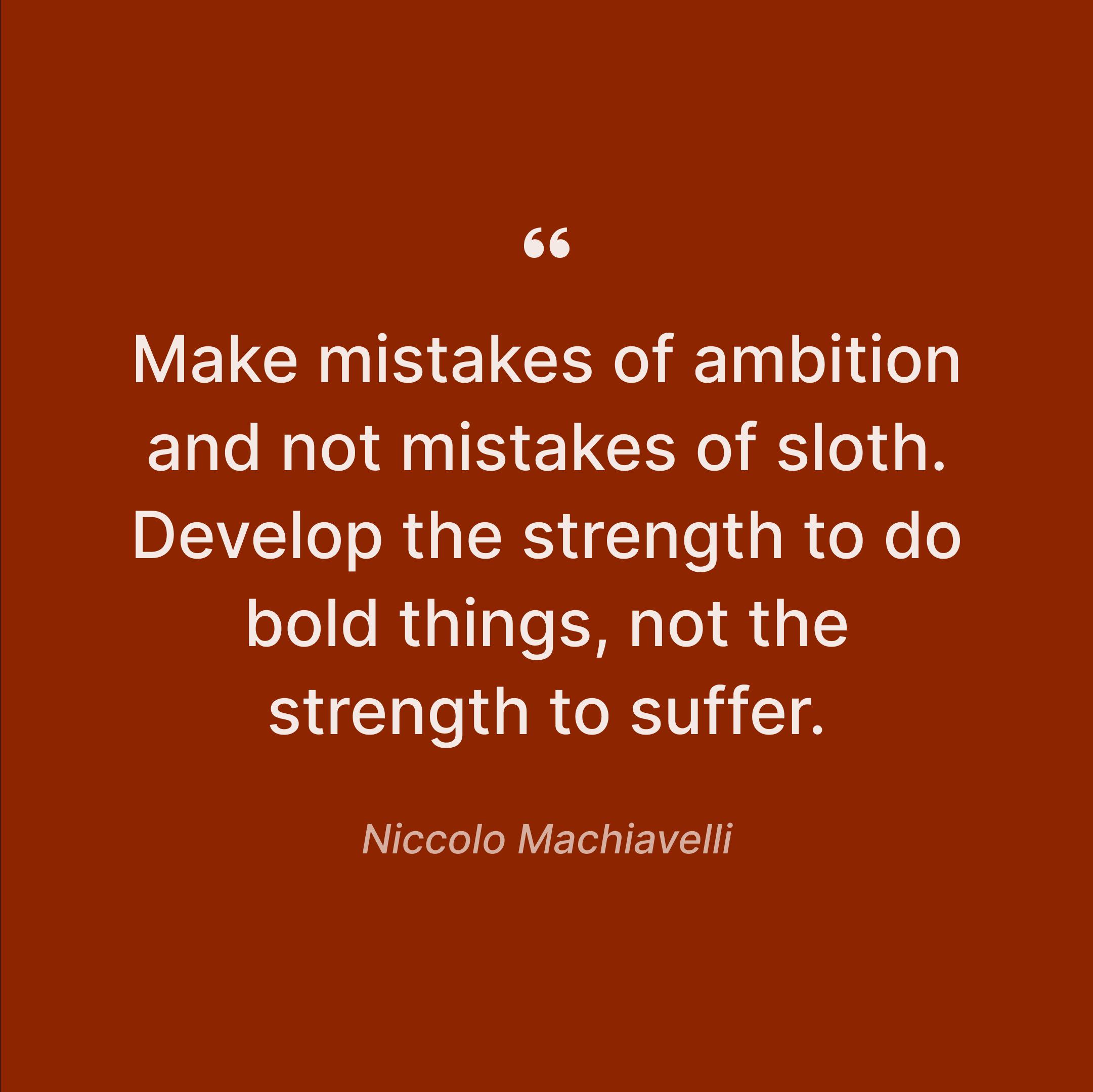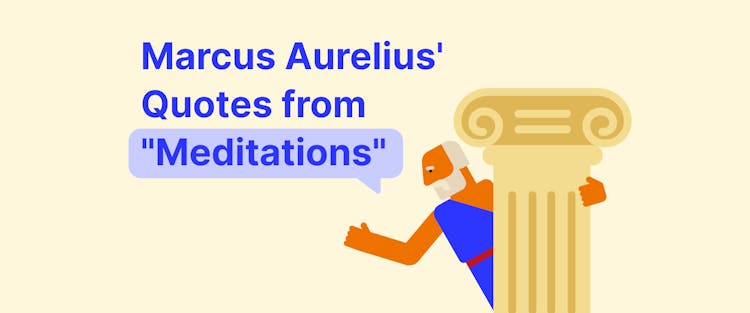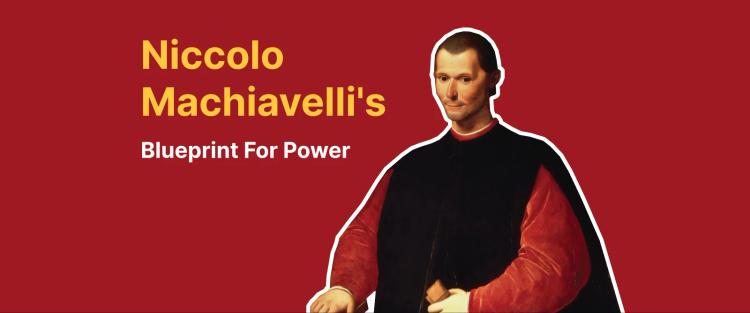Want to learn how Niccolò Machiavelli quotes can boost your leadership skills? As one of Italy's most influential political thinkers, Machiavelli's insights on power, strategy, and human nature resonate with today's leaders and strategists. Here are some of his lessons from works like 'The Prince,' 'The Art of War,' and more to help you apply his timeless wisdom to modern leadership.
In this article, you'll find 40 of the best quotes by the great Italian thinker bundled into such thematic blocks as "power," "leadership," and "warfare," picked from Machiavelli's most prominent works.
These and other classic strategy books are waiting for you in Headway's collection of online book summaries — your personal microlearning and self-growth tool with over 1700+ short summaries of nonfiction bestsellers. Explore Machiavelli's political philosophy on the go with a curated list of his best quotes!
Top 5 Niccolò Machiavelli quotes to remember:
"The end justifies the means."
"The wise man does at once what the fool does finally."
"It is double pleasure to deceive the deceiver."
"I'm not interested in preserving the status quo; I want to overthrow it."
"Never was anything great achieved without danger."
Keep reading for more essential quotes on strategic leadership, decision-making, and political wisdom by Niccolò Machiavelli!
What are the most famous Niccolò Machiavelli quotes?
Niccolò Machiavelli's political theory has shaped the leadership landscape for centuries and still matters today. His advice, "It is better to be feared than loved, if one cannot be both" is a great example of balancing authority with empathy and fostering respect without losing control.
Let's uncover more of Machiavelli's tips on power and strategy with his most famous lines fit for the corporate world and personal relationships alike.
6. "The lion cannot protect himself from traps, and the fox cannot defend himself from wolves. One must therefore be a fox to recognize traps, and a lion to frighten wolves."
Think of the lion as raw power and strength and the fox as cleverness and strategy. Relying only on your strength won't keep you safe from hidden traps, and being smart alone won't scare off every danger.
Real success in leadership comes when you learn to balance both, knowing when to stand strong like a lion and when to outsmart challenges like a fox. Picture yourself as a CEO in a tough, fast-moving market. You have to be sharp like a fox, always alert to the sneaky moves of new competitors or sudden changes in the rules.
But at the same time, you need to show the strength of a lion, standing firm to lead with confidence and keep bigger threats from taking over. It's this mix of savvy and power that helps you steer your company through the storm.
7. "Hence it comes about that all armed Prophets have been victorious, and all unarmed Prophets have been destroyed."
Having a vision is powerful, but without the tools and strength to back it up, even the best ideas can fall flat. As a leader, you need more than that. You need the means to push your vision forward.
Pairing your passion with strategies helps you set yourself up for real success. With this approach, you can build a solid team and secure the resources you need, giving you the edge to thrive, even in the toughest markets.
8. "All courses of action are risky, so prudence is not in avoiding danger (it's impossible), but calculating risk and acting decisively."
Avoiding all risks is unrealistic and utopian. True wisdom lies in understanding risks clearly and choosing to act with confidence despite uncertainty. Leadership is about bold, informed decisions, not hesitation or fear.
Suppose you're launching a new product. You research market trends and prepare contingency plans instead of fearing failure. This mindset empowers your innovation and growth rather than stagnation born of fear.
9. "A wise ruler should rely on what is under his own control, not on what is under the control of others."
This quote shows that real leadership starts with focusing on what's truly in your control: your decisions, resources, and actions. Relying too much on things or people outside your influence only leaves you vulnerable.
Take a project leader, for example. Trusting your team and building strong internal processes will always be more reliable than depending solely on partners. When you take ownership of what you can control, you build confidence and resilience that others will notice and respect.
10. "Everyone sees what you appear to be, few experience what you really are."
Your true nature and intentions are not always on the surface. They remain hidden, creating a gap between perception and reality. So, if you see a public speaker or a life coach projecting confidence and success, there can always be inner doubt and struggle behind the scenes.
Understanding this will help you stay authentic as a leader, manage impressions wisely, and connect deeper with your team by sharing genuine challenges. It also reminds you to be cautious in judging others based only on what's visible.
Top 30 quotes by Niccolò Machiavelli to lead by
If Niccolò Machiavelli had hosted a leadership podcast today, he would have definitely pointed out the art of making wise, strategic choices that inspire trust and command respect.
The following quotes by the Italian thinker provide raw, actionable guidance drawn from the realities of power and politics that leaders across industries can learn from.
'The Prince' quotes on power and politics
'The Prince' is Machiavelli's groundbreaking guide to political leadership and power dynamics, written in the turbulent Renaissance era. Inspired by Pope Alexander's son, Cesare Borgia, Machiavelli outlined the main principles of leadership on making tough decisions and creating firm boundaries.
The following quotes, thus, are about balancing kindness with firmness to maintain order and motivate results.
11 "The main foundations of every state new states as well as ancient or composite ones are good laws and good arms you cannot have good laws without good arms and where there are good arms, good laws inevitably follow."
"It must be considered that there is nothing more difficult to carry out, nor more doubtful of success, nor more dangerous to handle, than to initiate a new order of things."
"The new ruler must determine all the injuries that he will need to inflict. He must inflict them once and for all."
"A prudent man should always follow in the path trodden by great men and imitate those who are most excellent, so that if he does not attain to their greatness, at any rate he will get some tinge of it."
"Wise princes and republics should content themselves with victory; for when they aim at more, they generally lose."
"The best fortress which a prince can possess is the affection of his people."
"Men intrinsically do not trust new things that they have not experienced themselves."
"Make mistakes of ambition and not mistakes of sloth. Develop the strength to do bold things, not the strength to suffer."
"For whoever believes that great advancement and new benefits make men forget old injuries is mistaken."
"It is a common fault not to anticipate storms when the sea is calm."
Read or listen to the full summary of 'The Prince' by Niccolò Machiavelli on the Headway app.
Human nature and morality insights from 'The Discourses'
In ‘The Discourses,' Machiavelli shows how republics and societies function. He studies human nature, political morality, and the delicate balance between freedom and authority.
This work encourages leaders and citizens alike to understand the complexities of human behavior in group settings. Here are some key lessons to adapt in real life.
21 "Men are driven by two principal impulses, either by love or by fear."
"Everything that occurs in the world, in every epoch, has something that corresponds to it in ancient times."
"There is no surer sign of decay in a country than to see the rites of religion held in contempt."
"Let no man, therefore, lose heart from thinking that he cannot do what others have done before him."
"The salvation of a republic or a kingdom is not, therefore, merely to have a prince who governs prudently while he lives, but rather one who organizes the government in such a way that after his death it can be maintained."
"There is no surer sign of decay in a country than to see the rites of religion held in contempt."
"For he who seizes a tyranny and does not kill Brutus, and he who sets a state free and does not kill Brutus' sons, maintains himself but a little while."
"Whoever considers the past and the present will readily observe that all cities and all peoples are and ever have been animated by the same desires and the same passions."
"Having come to freedom, a corrupt people can with the greatest difficulty maintain itself free."
"A wicked citizen cannot do evil in a republic that is not corrupted."
Learn more about the power of negotiation and persuasion with the full summary of Robert Greene's 'The 48 Laws of Power' on the Headway app.
Strategy and warfare lessons from 'The Art of War' and more
'The Art of War' offers real-life strategies of military leadership and political warfare. The book lays out practical tactics for shaping a nation's survival and influence even in the most turbulent times.
The following lines offer timeless ideas on the psychology of conflict that extend beyond the battlefield and help you develop strategic foresight.
31 "A battle that you win cancels any other bad action of yours. In the same way, by losing one, all the good things worked by you before become vain."
"Since the handling of arms is a beautiful spectacle, it is delightful to young men."
"When they remain in garrison, soldiers are maintained with fear and punishment; when they are then led to war, with hope and reward."
"Every little advantage is of great moment when men have to come to blows."
"To know in war how to recognize an opportunity and seize it is better than anything else."
"In war, discipline can do more than fury."
"It is much better to tempt fortune where it can favor you than to see your certain ruin by not tempting it."
"There is nothing as likely to succeed as what the enemy believes you cannot attempt."
"The greatest remedy that is used against a plan of the enemy is to do voluntarily what he plans that you do by force."
"War makes thieves, and peace hangs them."
For more insights on strategy and planning, explore the full summary of 'The Art of War' by Sun Tzu on the Headway app.
How can you apply Machiavelli's quotes to modern leadership?
To apply Machiavelli's quotes to modern leadership, examine his life-changing tips through present-day settings and managing trends. When leading a team or starting your own business, stay adaptable to change and maintain control to keep everything in order. This section contains practical hacks for making decisions while applying Machiavellian leadership principles.
1. Balance fear and respect to lead effectively
Machiavelli realized that love and fear often go hand in hand. In today's world, that means setting clear expectations and consequences while earning genuine respect. Think about a manager who sticks to deadlines with firmness but fairness. People trust that leader because they know the rules are real, but they also feel valued.
2. Embrace pragmatism and adaptability
Machiavelli also suggests that leaders should be flexible and willing to change tactics: "Whosoever desires constant success must change his conduct with the times." Modern leaders face rapidly shifting markets, technologies, and workforce expectations.
Consider a startup founder improving their business model after customer feedback. A good leader embraces change and seizes new possibilities instead of clinging to an original plan. It increases your chances for success.
3. Be decisive and take control of your narrative
Your level of confidence matters when it comes to decision-making. So, if you're a leader in a company going through a crisis, your ability to address issues, communicate transparently, and outline clear next steps restores trust and guides the organization through uncertainty.
Lead with confidence using Headway book summaries
Niccolo Machiavelli's quotes are sharp and on-point, even many centuries later. His vision of leadership, power, and strategy keeps inspiring today's decision-makers and shaping political landscapes for many leaders. With our curated list of inspiring quotes, you can easily grasp core takeaways from his books and save them to your feed.
To deepen your understanding, the Headway app provides a concise, engaging summary of 'The Prince' along with other essential leadership and strategy books. Check out related titles:
'The 5 Levels of Leadership' by John C. Maxwell — a collection of expert-backed strategies to help you maximize your potential, no matter where you are in your leadership.
'Good Strategy/Bad Strategy' by Richard Rumelt — a comprehensive guide on strategic business ideas and how you can create a successful business brand.
'The 48 Laws of Power' by Robert Greene — a solid manual to upscale your strategy, power, and seduction.
Ready to level up your leadership skills? Download the Headway app today and fuel your growth with bite-sized book summaries that will transform powerful insights into a daily habit.
Frequently Asked Questions
What is Machiavellianism?
Machiavellianism is a leadership style focused on strategic manipulation, control, and pragmatic decision-making. It often gets linked to cunning or ruthless behavior, but at its core, it's about using intelligence and flexibility to maintain power and influence in complex situations.
What is Machiavelli's most controversial quote?
Machiavelli's most controversial quote is, "The end justifies the means." This phrase suggests that leaders can use any methods, even unethical ones, to achieve their goals. It challenges traditional ideas about morality in leadership and sparks debate about whether outcomes can excuse actions.
What are Machiavelli's 2 famous sayings?
Two of Machiavelli's most well-known sayings are:
"The ends justify the means."
This phrase reflects Machiavelli's belief that achieving political or strategic goals may require morally questionable actions.
"It is better to be feared than loved, if you cannot be both."
This quote emphasizes that fear is a more reliable tool than affection when it comes to maintaining control and authority.
What are 3 quotes from Machiavelli?
Here are three widely cited quotes from Machiavelli's works:
"The wise man does at once what the fool does finally."
A call for decisiveness and swift action."Never attempt to win by force what can be won by deception."
A reminder that subtlety and cunning are often more effective than brute strength."Men judge generally more by the eye than by the hand."
This suggests that appearance often matters more than substance when influencing others.
What is the most famous line from 'The Prince?'
"It is better to be feared than loved, if you cannot be both."
This line captures the essence of Machiavelli's pragmatic and sometimes ruthless approach to leadership and power. He believed fear creates stronger and more reliable loyalty than affection alone.
What are some quotes from Machiavelli about power?
Machiavelli's insights into power remain widely quoted. Notable examples include:
"A prince never lacks legitimate reasons to break his promise."
"Politics have no relation to morals."
"He who seeks to deceive will always find someone who will allow himself to be deceived."

